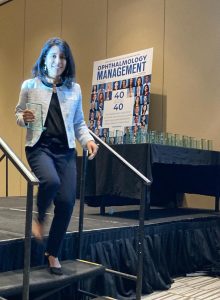Roomasa Channa, MD Named to Ophthalmology Management’s 40 Under 40
Amazing. That is how Roomasa Channa, MD of the University of Wisconsin Department of Ophthalmology and Visual Sciences is being described.
At a special reception at the American Academy of Ophthalmology (AAO) annual meeting in Chicago on September 30, 2022, Channa was recognized with a 40 Under 40 Award from Ophthalmology Management Magazine. The inaugural award honors the next generation of ophthalmologists, under 40 years of age, who have made a significant impact on their field. The list was announced in the magazine’s October issue.
“I am honored to be receiving this award,” Channa said. “I would like to extend heartfelt gratitude to everyone who has helped me along the way. Without the encouragement and support of my family, colleagues and mentors – past and current- I would not be where I am today.”
Channa, who is an assistant professor in the Department of Ophthalmology and Visual Sciences, joined the DOVS faculty in September 2020. As a clinician, Channa treats patients with retinal issues, such as diabetic retinopathy, retinal detachments, and macular degeneration, among other conditions. As a researcher, she uses artificial intelligence (AI) and big data to better understand and improve outcomes for patients with diabetic retinal diseases. She recently joined the department’s A-EYE research unit as a co-director to further foster research and implementation of AI algorithms to improve patient care and understanding of diseases. She is a leader in the moonshot effort funded by JDRF and The Mary Tyler Moore foundation to create a new staging system for diabetic retinal disease. She was funded by NASA to develop deep learning algorithms to predict stroke from fundus and OCT-A images. Dr. Channa is the communications director for the ADA’s Eye Health Interest Group Leadership Team, was selected as an Emerging Vision Scientist for National Alliance for Eye and Vision Research and was given an achievement award by the AAO this year for her contributions.
Channa was nominated by Michael D. Abràmoff, MD, PhD, Department of Ophthalmology and Visual Sciences at the University of Iowa Hospital and Clinics. “Roomasa is an amazing physician scientist,” Abràmoff said. “I have had the honor of mentoring her for the past four years, and in that time, she has discovered how neurodegeneration in diabetes differentially affects both neuroretina and outer retina, created a cost-effectiveness policy model for diabetic retinopathy screening, gained extensive experience in Artificial Intelligence and analyzing large patient datasets like the UK biobank. She is a highly dedicated clinician scientist and vitreoretinal surgeon, and, thanks to her great personality and insights, she is a highly successful team leader. She will go so much farther than this, and she has had such a fast start already.”
Channa obtained her medical degree from the Aga Khan University in Karachi, Pakistan. Afterward, she completed a pre-residency research fellowship in retina and uveitis at the Wilmer Eye Institute at Johns Hopkins University, as well as a one-year internal medicine internship at the St. Agnes Hospital in Baltimore, Maryland. Dr. Channa then returned to the Wilmer Eye Institute to complete her specialty training as an ophthalmology resident and vitreoretinal surgical fellow.
